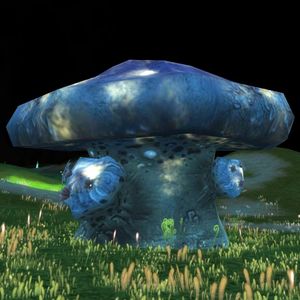From EncyclopAtys
m |
|||
| Line 1: | Line 1: | ||
| − | {{Lore Officielle}} | + | {{Lore Officielle}}{{Trad |
| − | {{Trad | ||
|DE=Fungao | |DE=Fungao | ||
| + | |DEs=4 | ||
|EN=Fungao | |EN=Fungao | ||
| − | |ES= | + | |ENs=4 |
| + | |ES=Fungao | ||
| + | |ESs=1 | ||
|FR=Fungao | |FR=Fungao | ||
| − | |RU= | + | |FRs=0 |
| + | |RU=Фунгао | ||
| + | |RUs=5 | ||
|H= | |H= | ||
| − | |palette= | + | |palette=primes}} |
| − | }} | ||
{{MobInfoBox | {{MobInfoBox | ||
|image=Fungao-L.jpg | |image=Fungao-L.jpg | ||
|name=Fungao | |name=Fungao | ||
| − | | | + | |king=Plants |
| − | |locale= | + | |species=[[:Category:Fungi|Fungus]] |
| − | |aggro= | + | |locale=[[Primes]] |
| − | |damage= | + | |aggro= No |
| + | |damage=None | ||
|}} | |}} | ||
The '''fungao''' looks like a giant mushroom (hence its name of [[zoraï]] origin which means precisely “mushroom”). [[Matis]] botanists suspect that it is actually a plant that lives in symbiosis with several types of microscopic fungi. The plant part ensures photosynthesis even in the tenuous light of the Prime Roots while the fungi draw forth the nutrients contained in the soil. | The '''fungao''' looks like a giant mushroom (hence its name of [[zoraï]] origin which means precisely “mushroom”). [[Matis]] botanists suspect that it is actually a plant that lives in symbiosis with several types of microscopic fungi. The plant part ensures photosynthesis even in the tenuous light of the Prime Roots while the fungi draw forth the nutrients contained in the soil. | ||
| Line 32: | Line 36: | ||
}} | }} | ||
[[Category:Flora]] | [[Category:Flora]] | ||
| + | [[Category:Fungi]] | ||
[[Category:Flora of the Primes]] | [[Category:Flora of the Primes]] | ||
Revision as of 13:37, 28 September 2019
| Taxonomic Amber | |
| Fungao | |
|---|---|

| |
| Kingdom | Plants |
| Category | Fungus |
| Main Ecosystem(s) | Primes |
| Counterattack type | None |
The fungao looks like a giant mushroom (hence its name of zoraï origin which means precisely “mushroom”). Matis botanists suspect that it is actually a plant that lives in symbiosis with several types of microscopic fungi. The plant part ensures photosynthesis even in the tenuous light of the Prime Roots while the fungi draw forth the nutrients contained in the soil.
The fungao has two modes of reproduction: one, sexual, assured by the plant that flowers on the outgrowths present on the periphery of the volva; the other, asexual, carried out by the animals that nibble the fungao and spread by their droppings the spores of fungi.
Its firm and nourishing flesh is eaten by homins once it is peeled (the surface layers being infected by pathogenic bacteria).
| |
| |




